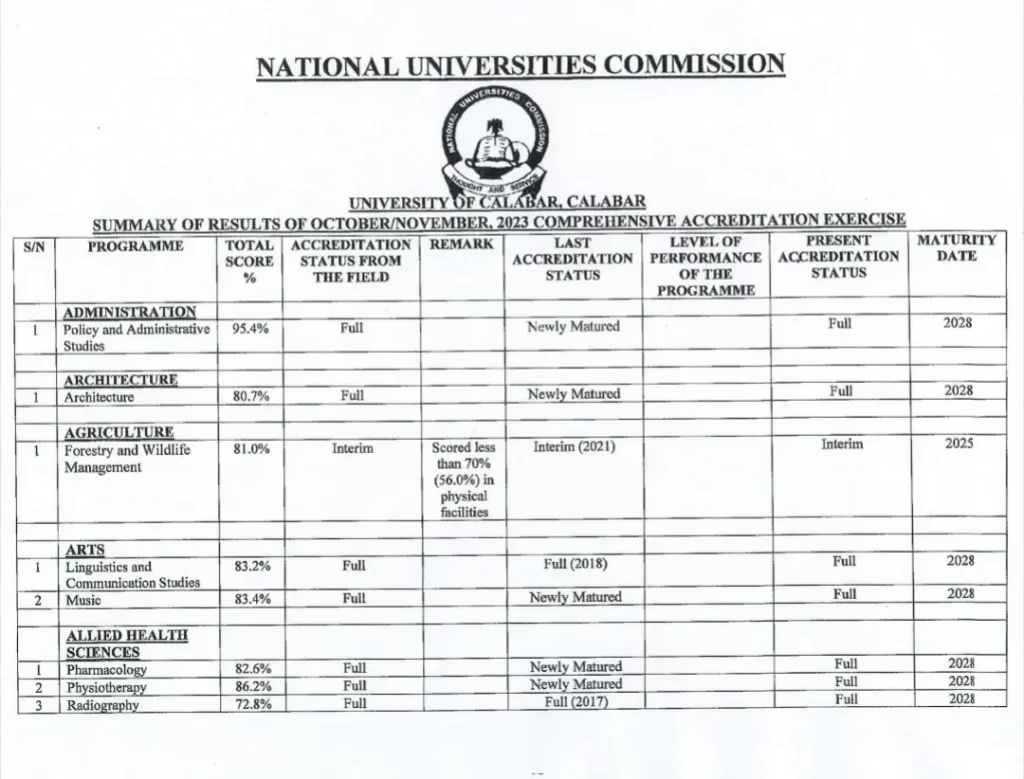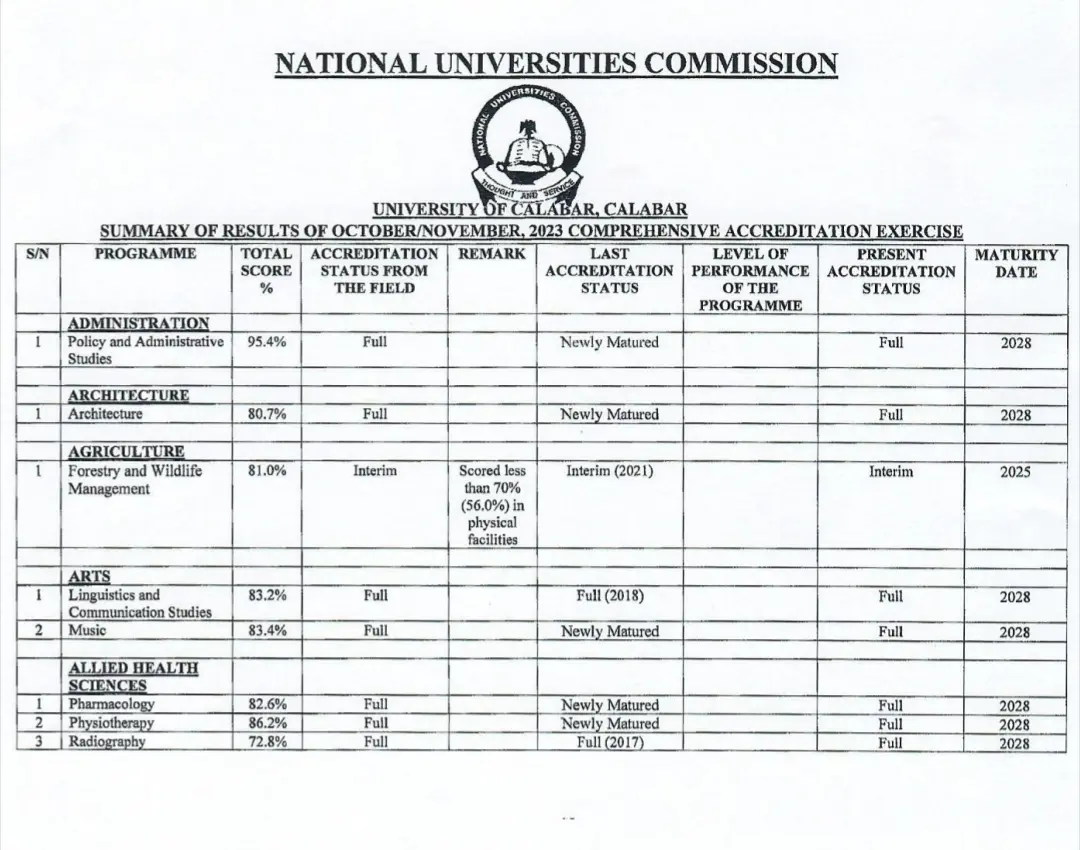The National Universities Commission (NUC) has granted accreditation to 39 programmes from 13 faculties at the University of Calabar (UNICAL).
CONVERSEER learned from the accreditation letter with reference number: NUC/ES/412/VOL.14/361, signed by Engr. Abraham Chundusu, Acting Director of Accreditation, for NUC Executive Secretary, that 35 out of 39 departments gained full accreditation while the remaining four were only given interim (partial) accreditation.
The letter which was addressed to the Vice-Chancellor of the University, Prof. Florence Obi, on 6th June 2024, also stated that the full accreditation is for five years (till 2028) while the interim accreditation is for two years (till 2025) for both postgraduate and undergraduate programmes.
The programmes that were granted full accreditation are Policy and Administrative Studies, Pharmacology, Physiotherapy, Radiography, Architecture, Linguistics and Communication Studies, Music, Human Physiology, Mass Communication, Educational Administration and Planning, Education English Language, Education Geography, Educational Psychology, Educational Technology, and Elementary Education.
Others granted full accreditation are Environmental Education, Guidance and Counseling, Home Economics, Agricultural Engineering, Chemical Engineering, Civil Engineering, Mechanical Engineering, Petroleum Engineering, Estate Management, and Environmental Protection and Resource Management.
The rest granted full accreditation are Fine and Applied Arts, Survey and Geo-informatics, Urban and Regional Planning, Mathematics, Microbiology, Science Laboratory Technology, Statistics, Peace and Conflict Studies, Political Science, and Social Work.
The four programmes that were granted interim accreditation are Forestry and Wildlife Management, Anatomy, Law, and Physics.
RESULTS OF THE OCTOBER/NOVEMBER 2023 ACCREDITATION OF ACADEMIC PROGRAMMES IN NIGERIAN UNIVERSITIES
“Section 10 (1) of the Education (National Minimum Standard and Establishment of institutions) Act CAP E3, Laws of the Federation of Nigeria 2004, empowers the National Universities Commission to lay down Minimum Academic Standards for all academic programmes taught in Nigerian Universities and also to accredit such programmes. In line with the provisions of the Act, the Commission organised the accreditation of academic programmes at the University of Calabar, Calabar in October/November 2023.
The result of the exercise is as follows:
ADMINISTRATION
1. Policy and Administrative Studies – Full
AGRICULTURE
1. Forestry and Wildlife Management – Interim
ALLIED HEALTH SCIENCE
1. Pharmacology – Full
2. Physiotherapy – Full
3. Radiography – Full
ARCHITECTURE
1. Architecture – Full
ARTS
1. Linguistics and Communication Studies – Full
2. Music – Full
BASIC MEDICAL SCIENCE
1. Anatomy – Interim
2. Human Physiology – Full
COMMUNICATION AND MEDIA STUDIES
1. Mass Communication – Full
EDUCATION
1. Educational Administration and Planning – Full
2. Education English Language – Full
3. Education Geography – Full
4. Educational Psychology – Full
5. Educational Technology – Full
6. Elementary Education – Full
7. Environmental Education – Full
8. Guidance and Counseling – Full
9. Home Economics – Full
ENGINEERING
1. Agricultural Engineering – Full
2. Chemical Engineering – Full
3. Civil Engineering – Full
4. Mechanical Engineering – Full
5. Petroleum Engineering – Full
ENVIRONMENTAL SCIENCE
1. Estate Management – Full
2. Environmental Protection and Resource Management – Full
3. Fine and Applied Arts – Full
4. Survey and Geo-informatics – Full
5. Urban and Regional Planning – Full
LAW
1. Law – Interim
SCIENCE
1. Mathematics – Full
2. Microbiology – Full
3. Physics – Interim
4. Science Laboratory Technology – Full
5. Statistics – Full
SOCIAL SCIENCE
1. Peace and Conflict Studies – Full
2. Political Science – Full
3. Social Work – Full
You are requested to please note the implications of the accreditation academic programmes of Nigerian Universities:
Implication for Postgraduate programmes
a) Accredited Status is valid for a period of five years;
b) NOT Accredited Status has the following implications:
i. Immediate ban on student admission into such programmes;
ii. Certificates issued to students admitted into such programmes after the ban on admission, will not be recognised. Students who are currently enrolled on the programme will not be affected.
Implication for Undergraduate programmes
a) Full Accreditation Status is valid for a period of five years;
b) Interim Accreditation Status is valid for two years after which the programmes will be re-visited. Programme that earns Interim Accreditation Status after two consecutive visits shall revert to DENIED Accreditation Status;
c) Denied Accreditation Status has the following implications:
i. Immediate ban on student admission into such programme(s);
ii. Certificates issued to students admitted into such programmes after the ban on admission, will not be recognised. Students who are currently enrolled on the programme will not be affected; and
iii. Such students admitted into programmes with Denied Accreditation Status after the ban, shall on graduation be denied call-up into the National Youth Service Corps scheme.
“Kindly note that the implementation of the Core Curriculum Minimum Academic Standards (CCMAS) commenced in the 2023/2024 academic session with students admitted into 100 level. To this end, your university is expected to ensure compliance with the utilisation of the CCMAS for all programmes.
“Please accept the assurance of the Executive Secretary’s highest regards,” part of the accreditation letter signed by Engr. Chundusu read.
Attached below are the technical reports and summary of results for the programmes visited.






